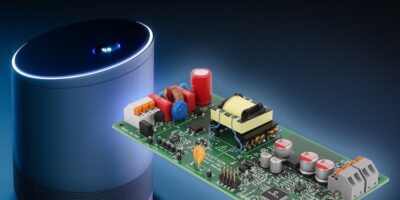Microchip unveils power control reference design to simplify AC/DC design
When used in smart home devices, offline AC/DC power relies on programmability and adaptive control to offer the flexibility and intelligence required to interface with the device’s power systems. In these systems, a secondary side microcontroller is typically not capable of starting a system without the use of a separate bias power supply. Microchip addresses this with a reference design which uses the MCP1012 high voltage auxiliary AC/DC controller. As a result, says Microchip, the independent bias power supply can be removed in many applications. The MCP1012 offline auxiliary device enables the system to transfer control of the power and duty cycle to a secondary microcontroller. The control between the system and the load can be more precise and purposefully coupled, through a design that can be simplified. This reduces size and cost, adds Microchip.
The reference design uses a patented isolation technique for isolated feedback. This patented Inde-Flux transformer technology is being licensed to Würth Elektronik eiSos. It is used in the Inde-Flux transformer (Part Number 750318659), which is sold as part of 15W MCP1012 offline reference design. The transformer combines the signal power and signal communication, eliminating the need for optical feedback or an independent signal transformer. The option is also available to use more traditional approaches with a planar pulse transformer on the reference design, as well as the ability of the design to work with more traditional optocouplers and signal transformers. The secondary side control is then enabled through a combination of the transformer and Microchip’s MCP1012 AC/DC controller along with the SAM D20 series 32-bit microcontroller.
The MPC1012 primary side auxiliary controller provides for system start up, gating and protecting an offline flyback converter for the secondary microcontroller. The device enables a range of benefits such as direct measurement and active regulation of voltage and/or current, high loop bandwidth by direct loop closure and simplified communication for load-referenced systems.
The MCP1012 offline reference design provides the principal working elements for a 15W offline power design with the necessary firmware to enable the elimination of the auxiliary power supply on the primary side, Microchip explains. This can reduce the complexity of the system including eliminating the need for optocouplers in many applications such as appliances and smart speakers.
Inde-Flux transformer technology, in cooperation with Würth Elektronik eiSos, can be scaled to standard and custom transformer designs for different voltages and power levels as needed.
The 15W MCP1012 offline reference design includes a user guide and comes with schematics and bill of materials, design files, firmware, and a demonstration unit. Microchip also offers a fundamental 1W evaluation board, the DT100118, for the MCP1012 AC-DC controller.




